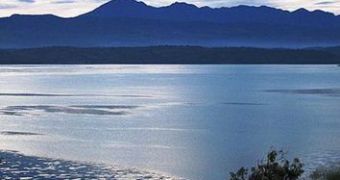One of the three “erupting” lakes in the world, Lake Kivu, is part of Rwanda's plan of new energy sources.
Even though the lake appears to be calm and harmless, it is more of a ticking time bomb due to the dissolved volcanic gases trapped in its waters.
If the methane and carbon dioxide within these reservoirs were ever to be released onto the surface, the two million people that live around the lake's shores would be in serious danger.
The lake is completely stratified, as the warm upper layer does not mix with the deep colder one, and all gases that enter the lake are trapped at the bottom.
The problem is that with the growing temperatures, in the next years the difference between the density and the temperatures of the two layers will decrease and the natural cap that prevents the gases from escaping back up to the surface will disappear.
The result will be similar to opening a soda bottle, and all escaping gases could do a bigger damage than Cameroon's Lake Nyos' eruption on August 15, 1984, when hundreds of people and animals suffocated instantly because of the cloud of highly-concentrated carbon dioxide released into the surrounding air.
For now, the lake only a stone's throw away from Nyurangongo volcano, is powering the Kibuye power plant along its shore, recently built by the government to extract the noxious gases and use the methane as fuel for three large generators.
The plant produces 3.6 megawatts of electricity, that could power over 4% of the country and within two years it should be able of covering a third of the country's needs, according to the government.
The ultimate goal is for the lake to become the country's first power source, as it is “a cheap, clean resource that could last up to 100 years,” like Alexis Kabuto, head engineer of the Kibuye project, told The Guardian in an interview, Discovery News reports.
So far so good, but people are still worried that a catastrophe could arrive any day and what could happen here at Kivu lake would be much worse than for Nyos.

 14 DAY TRIAL //
14 DAY TRIAL //